Film Name: 八佰 / The Eight Hundred
The ill-fated “The Eight Hundred” has finally hit theaters, and for the drought-stricken domestic film market, it is a real shot in the arm that can heat up the market, and for countless viewers, it is a blockbuster worthy of going into theaters to see.
However, the controversy/non-consensus about The Eight Hundred has always been high, from last year before the withdrawal to this year’s re-scheduling almost never stop, in addition to the director Guan Hu’s previous “fan of the operation”, but more from the film’s adaptation of the defense of the four warehouses, as well as the effect of the adaptation of the people for the difficult to say the same! Attitude ……
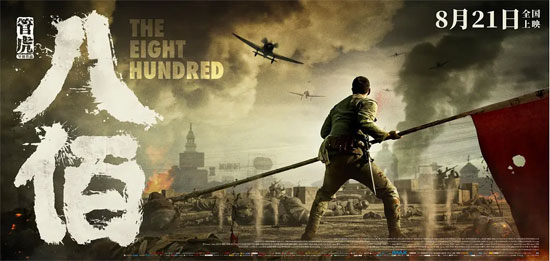
After watching the screening, I breathed a long sigh of relief, “The Eight Hundred” did not live up to its own previous expectations, it is a refreshing the standard of the same type of domestic works of the war film, shooting, technology, perception, etc. are more modernized, emotionally full, well-produced, and in the biggest contradiction in the focus — the main purpose of the intention of the film not only holds the line, but also made a thoughtful answer. The movie not only keeps the bottom line, but also makes a thought-provoking answer to the biggest contradiction – the main idea of the intention.
I think many people have made a mistake: historical adaptations of movies are secondary creations, there is a certain fiction and artistic processing is not a problem, and the movie is clearly borrowing the situation of the 800 warriors to satirize the national government’s weakness and incompetence, grabbing “historical facts” and “position” to deny that “The Eight Hundred Warriors” is not a movie. “Anyone who denies the value of The Eight Hundred misses the point.
As for the fact that the movie didn’t “entertain” the audience enough, apart from the fact that some of it wasn’t shot well, the feeling is actually spot on, because the humiliation that The Eight Hundred contains was never meant to be enjoyable to watch.
[Friendly reminder: spoilers below].
The Eight Hundred is not a melodramatic war movie, at least not in the sense that people think of it as “melodramatic”.
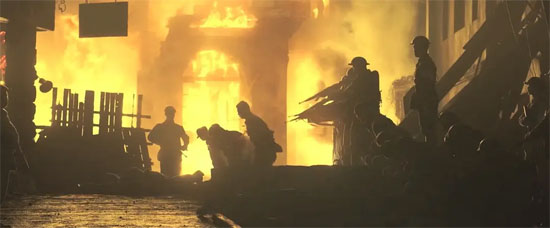
The tone of the movie is as “mourning” as the defeated national army: a team of Hubei local security guards thought they were going to Shanghai to clean up the battlefield, and then they were slaughtered like lambs by the Japanese army. ……
The movie uses the perspectives of the three uncles and nephews, namely Old Gourd, Duanwu and Little Hubei, to succinctly illustrate the reality of “people are like ants and their lives are like grass” in the chaotic world, the officer sitting in the sedan chair treats them as cannon fodder, the Japanese soldiers wielding the butcher’s knife treats them as livestock, and the direct line of the Central Army treats them as deserters, and in the words of “no one treats us as human beings”. In the context of “no one treats us as human beings”, the uncle and nephew were confusedly integrated into the Five Twenty-Fourth Regiment.
The Eight Hundred’s commendable effort to create a panoramic view of the war, with many angles, is the contrast between the peaceful tenement on the south bank of Suzhou Creek and the battlefield on the north bank, with one side of heaven and the other side of hell, which is the most dramatic point of the whole movie.
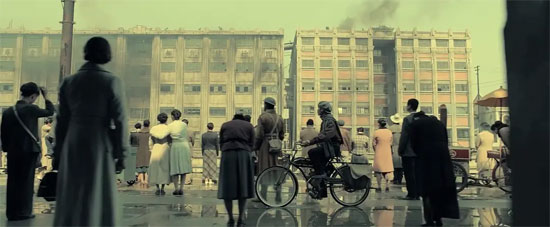
The movie is not in a hurry to show the firefight on the front battlefield, but spends a lot of time before and after the “stage” set up, tamping the foundation, constantly reinforced to ensure that the play can be sung steadily and for a long time.
At the same time, regardless of the film inside and outside the film, four rows of warehouses to defend the war is a “play”, those on the stage of the actors and actresses and ticket buyers, itself is also part of the play.
The unobtrusive foundation is well laid, in order to highlight the blade of the effort. As a war blockbuster with hundreds of millions of dollars of investment and domestic top stream participation, The Eight Hundred is unique in terms of audio-visual effects and immersion experience, especially for domestic war films, with many innovations and references.
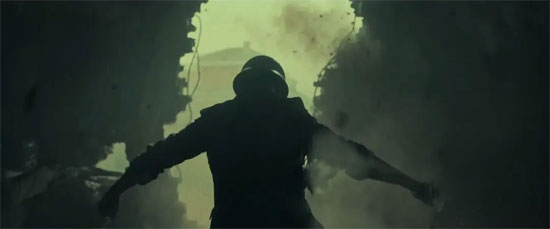
The movie is not satisfied with the perspective of the warring parties to show the intensity of the battle, but will frequently use different characters, different heights and different lenses of the many perspectives, to enrich the presentation of the full picture of the war (for example, the sharp eye of the veterans, the black and white lens of the party reporter, etc.).
Of course, the “The Eight Hundred” serious performance of the several climax scenes are not ambiguous, such as Chen Shusheng tied explosives in the body of the scene of the leap, far and near the camera frequently switched, the Japanese and the national army have swept, but also highlights the precarious situation, and finally in the last drop Mingzhi’s “sacrifice his life for righteousness, the child would like to also! “Finally, after dropping Mingzhi’s last words, the first-person camera following the character records the final image of him sacrificing his life to kill the enemy, which can be described as not tragic.
Unlike the usual war movies of the same genre, the dominant color of The Eight Hundred is not the usual leaden gray or grey-black, but rather a yellow-green that is close to bright and decaying, a color that approximates a post-apocalyptic twilight, further rendering the bleakness of the battle and the prospect of a bleak future – in addition, I also interpreted This hue is the result of mixing the gray of the battlefield with the flowing colors of the tenement, a yellow-green with a few splashes of blood to make it all the more demonic.
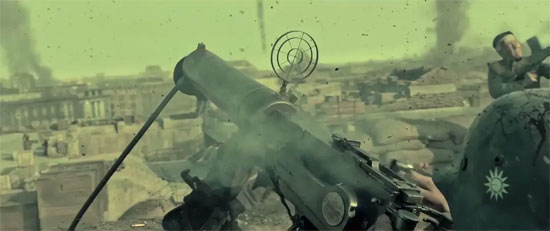
The intensity of the battlefield in The Eight Hundred is very strong, and it does not shy away from depicting death/gore/violence, with shots of severed limbs and blood flowing everywhere, which is enough to satisfy the tastes of some of the genre viewers, and at least PG-13 or above if it is to be rated.
It is worth mentioning that many details in the film are also quite elaborate, careful use of flamethrowers, water-cooled heavy machine guns can not be cooled resulting in blowing up and other depictions, can be understood that the crew attentively examined.
From the war performance effect, “The Eight Hundred” is very full and fiery emotions, even a lot of excessive sensationalism ……
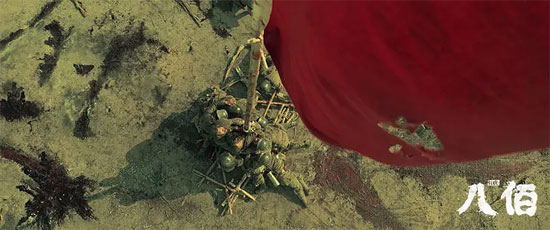
But in this movie, sensationalism is also appropriate: Japanese invasion, the fall of the country, the national army has been constantly routed for more than three months to retreat, the national consciousness is far from a widespread awakening, the loss of the front line and the lack of support in the rear, and now have to fight a doomed to lose the war, the kind of resentment, reluctance, and there is no place to vent their anger, is the need for full to overflowing expression of the strong emotions in order to release it.
Equally eye-catching as the war drama are the informative group scenes in The Eight Hundred.
The characters on the side of the rented world are as diverse as the passionate Chinese scout Yang Huimin, the university professor who is full of literary temperament, the reporter Fang Xingwen whose stance is unclear but can’t help but be infected, and so on, and the one who impresses me the most is the young “robber” Knife from the Bashu Chamber of Commerce.
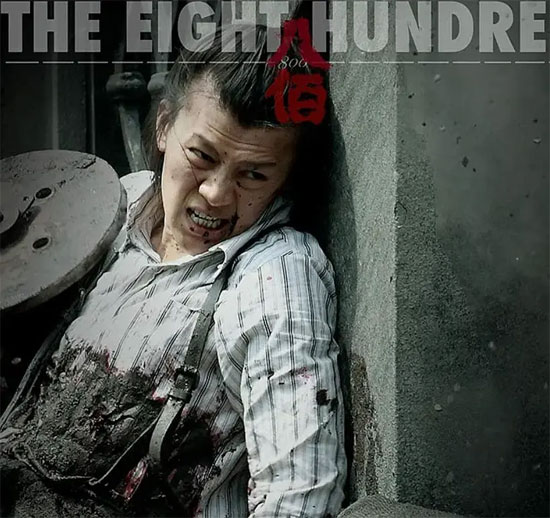
The movie apportioned to each person on the scene is not much, knife this role, good is good in relying on a few shots, his status and psychological changes have been shot: open casino backbone of the Brotherhood, the family of the fallen soldiers, would like to stay out of the way, but by the two sides of the pervasive blood infected, and then sacrificed his life for righteousness, jianghu gas and loyalty should be complete (the last Rong sister also did the same “silly thing”, donating the priceless morphine).
On this side of the battlefield, the characters are rich, the most typical to count three people: believe that “each person has his own destiny” of the veteran soldier oil sheep abduction, the only concern is the mother back home; cowardly and selfish “melon goat” Lao Tie, in the retreat can not retreat after the final transformation; tend to avoid the harm of the old abacus, only want to live. Abacus, who only wants to live, is the only one who carries out his escape to the end.
The Eight Hundred” puts the main perspective on this group of routed soldiers and deserters, and while the drama of the veterans and veterans is certainly profound, perhaps it is the transformation of the young people that will impress the audience more.
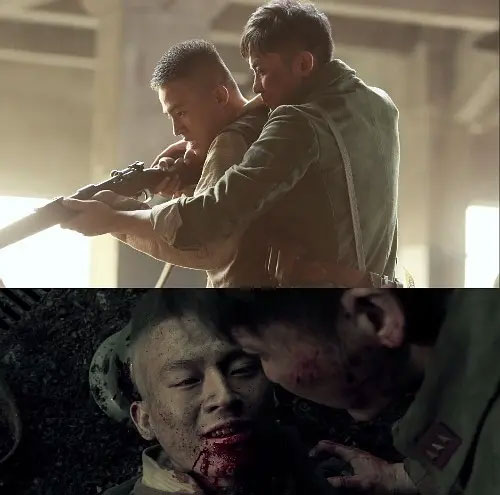
Duanwu epitomizes the millions of young people who were caught up in the war.
Duanwu had never seen the world and was most concerned about returning home to work the land. He and his brother joined the security forces probably because they followed their uncle’s advice to make a living (and to have a look at “Shanghai”), and never knew what the war meant, let alone that they would face death. …… Apart from trying to escape, he is passive in all he says and does, constantly being led by the nose.
But the private school listened to the theater of the Duanwu is not completely unaware of the reason, the troupe does not sing Guan Er Master and sing Zhao Zilong because the latter “protect the country”, around the group of people who are not afraid to die is also the protection of the country, under the influence of influence, do not want to die Duanwu changed sex, made the righteous act of dying generously.
Compared to his brother, Xiao Hubei symbolizes the rarer and more precious purity and innocence on the battlefield.
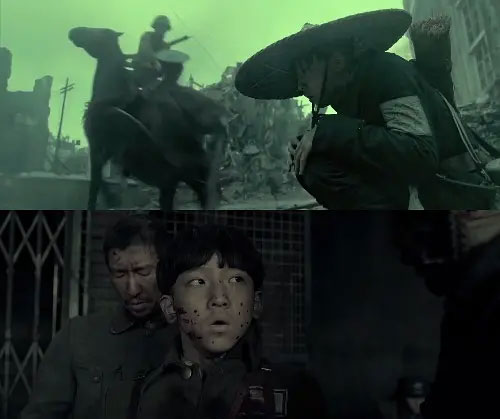
Children of this age, put today is estimated to have just started junior high school, do not understand anything, the face of the Japanese army’s butcher knife when he did not even know how to escape, just because the young and literate, was temporarily ordered to be Xie Jinyuan’s entourage …… Because of this, the small Hubei view of the world’s vision is more simple, the dusty steed of the white horse, the lights of the other side of the river, the violent deaths of his comrades and brother, the shadow play is long, all can bring the impact of the carving and engraving for his little mind. The white horse, the red lights of the other side of the river, the violent deaths of his comrades and older brother, and the longevity of the shadow puppet show all bring a deep impact to his little mind.
By the way, the mix of dialects in The Eight Hundred is a big plus, with Shanghai dialect, Hubei dialect, Cantonese dialect and other accents alternating, which not only adds authenticity, but also highlights the sense of time that is hidden underneath the film as if it were a lifetime ago.
However, The Eight Hundred has a lot of group scenes and is too full of information, which is a flaw that is hard to ignore.

Due to the main perspective has been relatively messy, many of the characters can only be considered shallow, and the film also added a lot of Zhu Shengzhong, Shangguan Zhibiao, Shandong soldiers and other heroic portrayal of the army, it is inevitable that some of the head is light and heavy, the flavor of the loss of one or the other.
Guan Hu too much want to shoot the war panorama, resulting in characters, plot priorities are not appropriate, and sometimes only rely on emotional impact and sensory stimulation to carry the pace, the overall look down the lack of smooth and natural (and some of them may have to be counted in the deletion of the above).
Do not consider the subject matter, domestic films and other factors, purely from a commercial movie “authorship”, “The Eight Hundred” belongs to the kind of idea a lot but the style of temperament has not adjusted the film, so many viewers eye-opening White Horse bridge, is a very obvious example.

And the atmosphere of the film is not compatible with the sudden appearance of the white horse, but also running around to spread joy, clearly is aimed at the “writing” to go, spotless seems to have an anti-war meaning, through the battlefield and the war flag style, in the small Hubei fantasy, the dead Dragon Boat has also incarnated into the image of Zhao ZiLong, freshly clothed and angry, charging to kill the enemy is the spirit of the national spirit and the war! The epitome of the spirit of ……
I can’t say that the shooting is bad, but the overall atmosphere is not in place, and the section of the white horse is slightly hard, and the meaning is also discounted (this is a matter of opinion, I think there is still room for improvement).
Finally, the most sensitive part of “The Eight Hundred” is that the production and effects are only the “skin” of the movie, and the intention and spirit of the movie is the “bone”.
First of all, we have to understand that the defense of the Four Row Warehouse was not a glorious battle from the beginning to the end – the Chinese army suffered heavy casualties in the Songhu Battle and lost again and again, and in the background of the retreat of the army, Chiang ordered the 88th Division to stay in the Four Row Warehouse for political show, hoping to gain the support of the Western powers through a “live broadcast”. “The four-day and four-night battle was not particularly fierce. Afterwards, the 524th Regiment guarding the Four Row Warehouse carried out the retreat order, but after retreating into the Concession, the 524th Regiment was disarmed and placed under house arrest, and then Xie Jinyuan was assassinated, and the rest of the generals also experienced more wasted destinies… …

Therefore, the key to characterizing The Eight Hundred is not how spectacularly and gruesomely the war scenes are filmed, but how the retreat of the May 24th Regiment is explained.
In the author’s opinion, the film has stepped on this point accurately and solidly. The scene in which the commissioner’s special agent, played by Huang Xiaoming, converses with Xie Jinyuan has made the right tonal choice for the key twist of the whole movie. The special agent’s words are clear: I respect you as heroes, but the mediation outside has failed, and then take a step back to say that, no matter whether it is a success or a failure, it does not make any sense to continue to hold out. (First line) leave some seeds, leave some hope for the national …… This is the highest order, you must obey.
A grandiose reason, the actual groove countless, only poor “family and country broken at the time, with the body of the soldier to serve the ancestors”, holding the belief of certain death Xie Jinyuan, even give the opportunity to take the righteousness of life, which is called the naked irony.

Taking the retreat plot as a dividing line, the before and after parts of The Eight Hundred are more like two movies, the first half is hot and exciting, and the story development has a trace, while the second half is twisted and torn, and the viewing experience is not good, confusing and chaotic, and there is no beginning and no end.
This is a more advanced comparison, previously ordered to guard the time, everything is very simple, but is the difference between war and no war, life and death just …… can be ordered to retreat, everything has become complicated, rather than the blood and courage of the jade is dissolved, the belief in sacrificing his life to become a benevolent fall into the void, only to leave a sense of resentment of the emptiness of the generals to fill the The Eight Hundred
The Eight Hundred” elaborately creates (fictionalizes) a magnificent defense of the Four Row Warehouse. The more exciting the blood-soaked war scene is, the more stifling the chaos of the retreat scene is, and there is not even a single shot of how those who stayed behind to break the back, such as Sheep Abductors, Lao Tie, and Xiao Hu Bei, blocked the attack, or died – because the context has already changed. -Because in the changed context, their sacrifices become “meaningless”.

And those soldiers who were wounded and killed when crossing the bridge, they did not casualties in the front line of resistance to the enemy, but fell in the path of retreat …… With more and more hands reaching out in the tenement, the movie came to an abrupt end, leaving the audience with only a mouthful of turbid air that was not exhaled.
Suffocation! Indignation! Shame! Like my favorite anti-war drama My Chief and My Regiment, The Eight Hundred is ostensibly all about the National Army’s resistance to the war, while at the same time blackening the power-struggling, loyalty-failing, corrupt, ossified, cowardly and incompetent National Government.
If we have to say that The Eight Hundred is “washing the ground”, it is only the soldiers who resisted foreign insults and sacrificed their lives for the country, not the KMT and the Nationalist government who put their hopes for the future of the country on the Western powers, who delayed the declaration of war on Japan until December 1941, and who lost the mainland in the past and now have lost the small islands. National Government.

Tale after tale of war abounds, but there is no other story as absurdly satirical and dramatic as the defense of the Four Row Warehouse, and The Eight Hundred picks its material well, and shoots it as well as it should.
I understand that due to the director’s inappropriate words and actions as well as some of the film’s own problems, some viewers will never see this film, and I’m not in a position to change their views, but in the year since it was withdrawn from release, the filmmakers have learned a lesson and made changes, and I hope that more people can overcome their prejudices and reacquaint themselves with this rare domestic war movie.
Please specify:Anime Phone Cases » The Eight Hundred 2020 Film Review: Humiliating? That’s right!